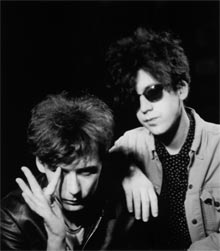
GREAT SCOTS After nearly 30 years, the Jesus and Mary Chain are now considered legends in the psych-rock subculture. |
For anyone interested in gritty, stylish psych-rock with smoky swirls of noise and ambience, 2012 is a pretty good place to be. Austin's annual Psych Fest and Boston events like the Deep Heaven Now series are proof that, as musicians discover new ways of incorporating computers, just as many are diving deeper into the guitar-driven world of classic psych. There is no doubt that the face of American psych looks a lot different than it did in years past. Whereas the Paisley Underground in the '80s and Elephant 6 scene of the '90s took cues from the Beatles and Beach Boys, most current psych bands look toward the darker hues of the Velvet Underground, Krautrock, and early alternative bands like Scottish legends the Jesus and Mary Chain, whose seminal 1985 debut, Psychocandy, brilliantly married minimalist early rock with noise and pop.
"Everyone since Link Wray or bands like the Beatles were trying to find a unique sound by incorporating intentional feedback loops," says Jasno Suarez of New York City psych-rock band the Vandelles. "Using feedback as an instrument itself was something of a breakthrough when I discovered Psychocandy in my early teens." Deep Heaven Now producer/founder Jinsen Liu, also of Boston's 28 Degrees Taurus, agrees: "They were undoubtedly one of the most influential bands that set the tone for a lot of what was to come. They were at their core very accessible rock, pop, and even delved into elements of country late in their career as well. They took a lot of chances."
At his home in the Southwest of England, JAMC founder Jim Reid is a little surprised that the band that he started almost 30 years ago with his brother William has become so influential. Although he's heard whispers here and there that people are copping his sound, Reid feels detached from the music scene he has long left behind (JAMC's last proper album was 1998's Munki). Now a father of two and separated, Reid doesn't follow new bands anymore, but his light, soft-spoken manner indicates a newfound peace; no longer does he have to be scared of pleasing record labels or troubled by the stresses that once drove him and brother William to feverish mutual animosity.
"It's all totally on our own terms now," says the singer and guitarist, who brings the Chain to the 'Dise for two shows next week. The UK scene was not only stifling in terms of labels, but also in terms of the narrow channels that existed for music, period, compared to today. "There seemed to be nowhere for alternative music to exist back then. You bring out a record, and you're on the same TV shows and the same radio programs. You're kind of up against Spandau Ballet and Culture Club. It did feel like people were fighting over the same crumbs." According to Reid, much of the conservative, unhealthy competitiveness that led to his success had to do with the Thatcher government, where the mantra was to stomp on as many people as you could on the way up. "There was kind of a national mentality of greed, I suppose. I don't even say that we didn't buy into that. It seeps into you."